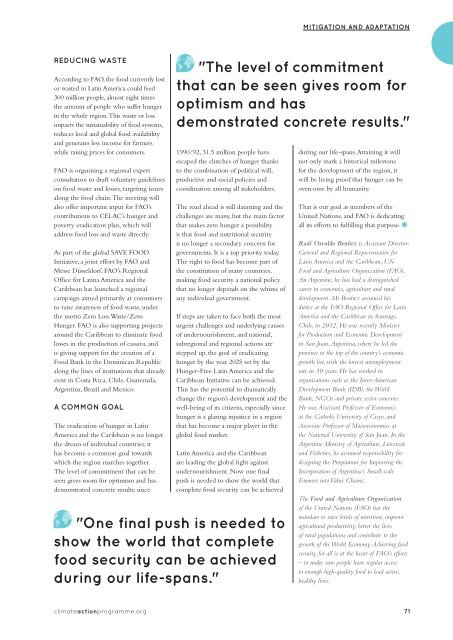Climate Action 2014-2015
You also want an ePaper? Increase the reach of your titles
YUMPU automatically turns print PDFs into web optimized ePapers that Google loves.
MITIGATION AND ADAPTATION<br />
REDUCING WASTE<br />
According to FAO, the food currently lost<br />
or wasted in Latin America could feed<br />
300 million people, almost eight times<br />
the amount of people who suffer hunger<br />
in the whole region. This waste or loss<br />
impacts the sustainability of food systems,<br />
reduces local and global food availability<br />
and generates less income for farmers<br />
while raising prices for consumers.<br />
FAO is organising a regional expert<br />
consultation to draft voluntary guidelines<br />
on food waste and losses, targeting issues<br />
along the food chain. The meeting will<br />
also offer important input for FAO’s<br />
contributions to CELAC’s hunger and<br />
poverty eradication plan, which will<br />
address food loss and waste directly.<br />
As part of the global SAVE FOOD<br />
Initiative, a joint effort by FAO and<br />
Messe Düsseldorf, FAO’s Regional<br />
Office for Latina America and the<br />
Caribbean has launched a regional<br />
campaign aimed primarily at consumers<br />
to raise awareness of food waste, under<br />
the motto Zero Loss Waste/Zero<br />
Hunger. FAO is also supporting projects<br />
around the Caribbean to eliminate food<br />
losses in the production of cassava, and<br />
is giving support for the creation of a<br />
Food Bank in the Dominican Republic<br />
along the lines of institutions that already<br />
exist in Costa Rica, Chile, Guatemala,<br />
Argentina, Brazil and Mexico.<br />
A COMMON GOAL<br />
The eradication of hunger in Latin<br />
America and the Caribbean is no longer<br />
the dream of individual countries; it<br />
has become a common goal towards<br />
which the region marches together.<br />
The level of commitment that can be<br />
seen gives room for optimism and has<br />
demonstrated concrete results: since<br />
1990/92, 31.5 million people have<br />
escaped the clutches of hunger thanks<br />
to the combination of political will,<br />
productive and social policies and<br />
coordination among all stakeholders.<br />
The road ahead is still daunting and the<br />
challenges are many, but the main factor<br />
that makes zero hunger a possibility<br />
is that food and nutritional security<br />
is no longer a secondary concern for<br />
governments. It is a top priority today.<br />
The right to food has become part of<br />
the constitution of many countries,<br />
making food security a national policy<br />
that no longer depends on the whims of<br />
any individual government.<br />
If steps are taken to face both the most<br />
urgent challenges and underlying causes<br />
of undernourishment, and national,<br />
subregional and regional actions are<br />
stepped up, the goal of eradicating<br />
hunger by the year 2025 set by the<br />
Hunger-Free Latin America and the<br />
Caribbean Initiative can be achieved.<br />
This has the potential to dramatically<br />
change the region’s development and the<br />
well-being of its citizens, especially since<br />
hunger is a glaring injustice in a region<br />
that has become a major player in the<br />
global food market.<br />
Latin America and the Caribbean<br />
are leading the global fight against<br />
undernourishment. Now one final<br />
push is needed to show the world that<br />
complete food security can be achieved<br />
"One final push is needed to<br />
show the world that complete<br />
food security can be achieved<br />
during our life-spans."<br />
"The level of commitment<br />
that can be seen gives room for<br />
optimism and has<br />
demonstrated concrete results."<br />
during our life-spans. Attaining it will<br />
not only mark a historical milestone<br />
for the development of the region, it<br />
will be living proof that hunger can be<br />
overcome by all humanity.<br />
That is our goal as members of the<br />
United Nations, and FAO is dedicating<br />
all its efforts to fulfilling that purpose. <br />
Raúl Osvaldo Benítez is Assistant Director-<br />
General and Regional Representative for<br />
Latin America and the Caribbean, UN<br />
Food and Agriculture Organization (FAO).<br />
An Argentine, he has had a distinguished<br />
career in economics, agriculture and rural<br />
development. Mr Benítez assumed his<br />
duties at the FAO Regional Office for Latin<br />
America and the Caribbean in Santiago,<br />
Chile, in 2012. He was recently Minister<br />
for Production and Economic Development<br />
in San Juan, Argentina, where he led the<br />
province to the top of the country’s economic<br />
growth list, with the lowest unemployment<br />
rate in 30 years. He has worked in<br />
organisations such as the Inter-American<br />
Development Bank (IDB), the World<br />
Bank, NGOs and private sector concerns.<br />
He was Assistant Professor of Economics<br />
at the Catholic University of Cuyo, and<br />
Associate Professor of Macroeconomics at<br />
the National University of San Juan. In the<br />
Argentine Ministry of Agriculture, Livestock<br />
and Fisheries, he assumed responsibility for<br />
designing the Programme for Improving the<br />
Incorporation of Argentina’s Small-scale<br />
Farmers into Value Chains.<br />
The Food and Agriculture Organization<br />
of the United Nations (FAO) has the<br />
mandate to raise levels of nutrition, improve<br />
agricultural productivity, better the lives<br />
of rural populations and contribute to the<br />
growth of the World Economy. Achieving food<br />
security for all is at the heart of FAO’s efforts<br />
– to make sure people have regular access<br />
to enough high-quality food to lead active,<br />
healthy lives.<br />
climateactionprogramme.org 71












